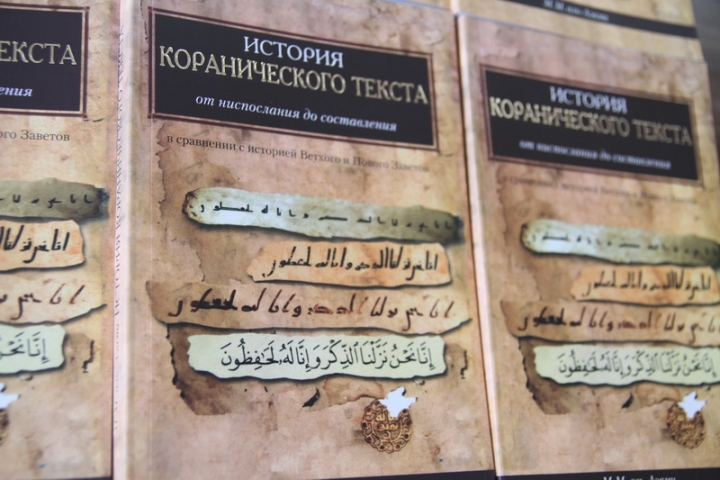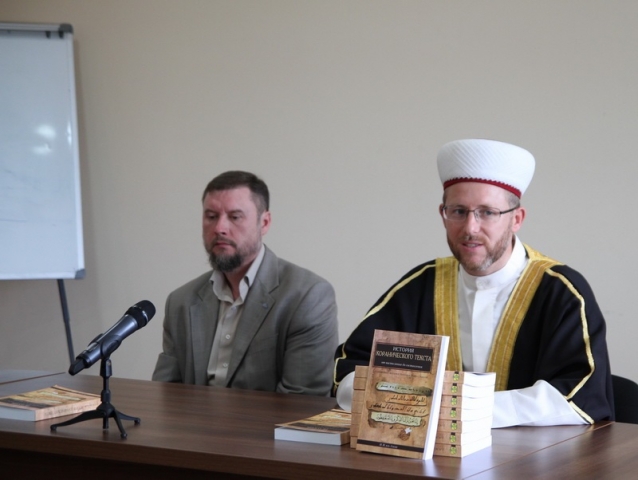“Guidance, comfort and beauty. For the believing Muslim the Holy Qur’ān is all this and much more: the heartbeat of faith, a remembrance in times of joy and anguish, a fountain of precise scientific reality and the most exquisite lyricism, a treasury of wisdom and supplications. All this is expressed in the most profound manner and in most beautiful words, assuring us that this is the Word of Allah,” — reads the introduction to the Russian translation of the latest book by Muhammad Mustafa Al-A’zami, “The History of the Qur'ānic Text: From Revelation to Compilation” (“Ansar Foundation” Publishing), translated and published under the auspice of AUASO “Alraid”.
As told by Mr.Islyam Gimadutin, the Editor-in-Chief, this work is interesting for both Muslims and non_muslims, Islamic researchers and ordinary people interested in history of religions.
“Others have been no more charitable, seeing fit to heap abuse or cast suspicion upon it throughout the centuries and up to our present day, among them scholars, missionaries, and now even the occasional politician. Such a dichotomy is aggravating to Muslims and certainly perplexing to the non-Muslim, who would be well justified in supposing that each group was alluding to a different book altogether. What are the facts and what is the evidence? Faced with such an immense and sensitive topic brimming with ideas to consider, I could have begun my exploration anywhere; the starting point, as it finally turned out, was to be an article by someone I had never heard of before,” — the author further writes.
“What is the Koran?”, the lead article of the January 1999 issue of The Atlantic Monthly, raised many issues concerning the origins and integrity of the Qur’ān.[3] The author’s credentials, a certain Toby Lester, are given in the magazine and suggest that he does not have any knowledge of Islam aside from having lived in Yemen and Palestine for a few years, though this hardly seems to hinder him for he delves headlong into controversy.”
Muhammad Mustafa Al-A'zami (Arabic: محمد مصطفى الأعظمي) is a contemporary hadith scholar best known for his critical investigation of the theories of Ignác Goldziher, David Margoliouth, and Joseph Schacht.
Born in Mau, India in the early 1930s, Al-A'zami received his education successively at Darul Uloom Deoband (1952), Al-Azhar University (M.A., 1955), and the University of Cambridge (Ph.D., 1966). He is Professor Emeritus at King Saud University where he also chaired the department of Islamic Studies. Al-A'zami served as curator of the National Public Library of Qatar, Associate Professor at Umm al-Qura University, Visiting Scholar at the University of Michigan (Ann Arbor), Visiting Fellow at St Cross College, Oxford, King Faisal Visiting Professor for Islamic Studies at Princeton University, and Visiting Scholar at the University of Colorado at Boulder. He is also an Honorary Fellow in Islamic Studies at the University of Wales, Trinity Saint David.
In 1980, he was the recipient of the King Faisal International Award for Islamic Studies. Much of A'zami's work focused on the correction of perceived inadequacies of Western scholarship on hadith literature, especially on highlighting the fact that there was already intense literary activity on hadiths during the lifetime of the Muslim prophet Muhammad, at his encouragement.



